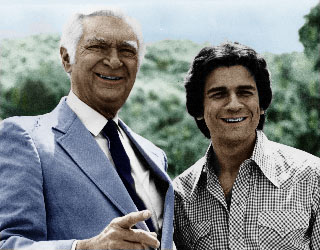The DGA reports that TV drama series producers have notched a 61% improvement in delivering scripts on time.
The percentage of on-time scripts for single-camera one-hour dramas had increased to 61% for the 2003-04 season, up from 47% in the previous season. The DGA also said the proportion of scripts delivered more than two days late had been cut to 23% from 41% and the number coming in five to 15 days late dropped to 8% from 20%.
By “on time,” the DGA means having a script ready for the first day of pre-production, aka “prep.” Episodic TV directors have seven days to scout locations, cast actors, etc. before beginning the actual shooting of their episodes. It doesn’t seem like a lot of time when compared to features… but in TV shows, the majority of actors are already in place (the regular weekly cast), the major sets are already built (the standing sets, like the hospital in ER), and the production team is already a well-oiled machine. But if a director is new to the show, a week can seem like precious little time… even to a director who has worked on the show before, it can be tight.
It’s even tighter when the script isn’t ready for prep. Not only is the director screwed… so are the location scouts, the wardrobe department, the production designer etc… everyone is pressed for time and can’t possibly do their best work.
But mostly, it’s terribly unfair to directors. Because when the director delivers their show, and its mediocre, nobody at the network or studio is saying “yeah, well, he only had four days to prep.” The director gets the blame… and everyone conveniently forgets he was sabotaged from day one.
And I’m saying all this as a producer who just delivered a script one day late for prep.
Guild said the writers for eight series — “Star Trek: Enterprise,” “Law & Order,” “The District,” “JAG,” “Judging Amy,” “She Spies,” “Hack” and “Strong Medicine” — delivered all scripts on time in 2003-04. “Six Feet Under” was the only series to deliver all its scripts on time in 2002-03.
The DGA also said 12 series improved by 20% — “24,” “Alias,” “Angel,” “The District,” “ER,” “The Guardian,” “Hack,” “JAG,” “Judging Amy,” “Law & Order,” “Third Watch” and “The West Wing.” It credited CBS, Fox, Sony, Touchstone, Universal and Warner Bros. with improvement of 20% in the 2003-04 season.
Guild also singled out “Ed” and “The Gilmore Girls” as not delivering a single script on time and pointed to five other shows — “Charmed,” “Everwood,” “Law & Order: SVU,” “NYPD Blue” and “The Practice” — as delivering more than 70% of their scripts late.
The number one priority of any showrunner, I believe, is the make sure a shooting script is ready on the first day of prep. Ideally, the teleplay should be in well before prep, so all the department heads … casting, production design, wardrobe, etc… have plenty of the opportunity to do their best work and to be thinking about the episode even before the director arrives. You get better guest stars for the parts if the casting director has two weeks instead of one to find the right actors for the role…if the location scout has an extra week to find best places to shoot… if the set designer has the extra week to create interesting sets. You get the idea.
There are times when events beyond a producer’s control make it impossible to deliver a script on the first day of prep… one of your stars takes ill, a storm makes it impossible to shoot an “outdoor” episode outdoors, the network re-arranges air order of the episodes at the last minute, etc. Inevitably, on every series I’ve been on, at least one or two scripts are delivered late.
It’s quite common on the first season of a show for scripts to come in late. Everything seems to be conspiring against delivering the scripts on time.. a late-pickup from the network, last-minute staffing and especially, the creative process as a show “finds itself” while being battered from all sides by notes from the network, the studio, the stars. Plus, it takes some time for everyone to learn how to work together, to discover the unique production problems inherent in your show. It can take a while for a new series to get settled, creatively and from a basic production stand-point.
But after a show has been on a season or two, there’s really no excuse for 70% of the scripts being delivered late. “NYPD Blue,” “Charmed,” and “Law & Order SVU” have been on the air for years… with relatively little staff turnover. You’d think they’d have it down by now. I can’t imagine what their excuse is. (And in the case of “SVU,” they aren’t waiting around for a back-nine pick-up, they already have a multi-year renewal, they can bank scripts well in advance)
The lateness of “Gilmore Girls” and “The Practice,” I would guess, has more to do with the fact that most of the scripts are written or rewritten by one showrunner (ie David Kelley on “The Practice”) who is stretched too thin. This, to me, is a big argument against the “writer-auteur” in episodic television… unless, like British TV, all the scripts are written well before production begins.
I’m glad to see there’s been a concerted effort in the industry to deliver scripts in time for prep — it’s good for everybody.









 The funny folks at
The funny folks at 
